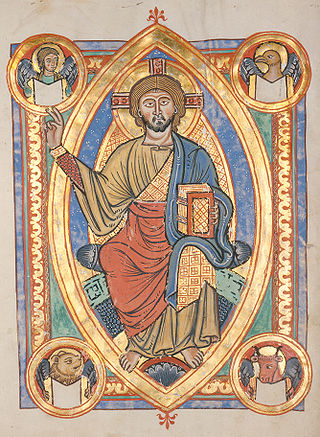
"Love Divine, All Loves Excelling" is a Christian hymn by Charles Wesley, first published in 1747. It was initially published as part of his Hymns for Those that Seek and Find and quickly became a central hymn in both Methodist and wider Christian worship. The hymn reflects Wesley's teachings on Christian perfection, expressing a longing for God's transforming and sanctifying grace.

The following are Roman Catholic prayers to Saint Joseph.

"For All the Saints" was written as a processional hymn by William Walsham How, who would later become the Bishop of Wakefield in the Church of England. The hymn was first printed in Hymns for Saints' Days, and Other Hymns, by Earl Nelson, 1864.

The "Salve Regina", also known as the "Hail Holy Queen", is a Marian hymn and one of four Marian antiphons sung at different seasons within the Christian liturgical calendar of the Catholic Church. The Salve Regina is traditionally sung at Compline in the time from the Saturday before Trinity Sunday until the Friday before the first Sunday of Advent. The Hail Holy Queen is also the final prayer of the Rosary.

"Alma Redemptoris Mater" is a Marian hymn, written in Latin hexameter, and one of four seasonal liturgical Marian antiphons sung at the end of the office of Compline.
An Akathist or AcathistHymn is a type of hymn usually recited by Eastern Orthodox and Byzantine Catholic Christians, dedicated to a saint, holy event, or one of the persons of the Holy Trinity. The name derives from the fact that during the chanting of the hymn, or sometimes the whole service, the congregation is expected to remain standing in reverence, without sitting down, except for the aged or infirm.
Phos Hilaron is an ancient Christian hymn originally written in Koine Greek. Often referred to in the Western Church by its Latin title Lumen Hilare, it has been translated into English as O Gladsome Light. It is one of the earliest known Christian hymns recorded outside of the Bible that is still in use today. The hymn is part of vespers in the Eastern Orthodox Church and the Byzantine Rite of the Catholic Church, and also included in some Anglican liturgies and Lutheran hymnals.
The Prayer to Our Lady of Mount Carmel is a prayer in the Roman Catholic Church. It is a part of a novena for prayer beginning on July 7, July 8, and in time of need.
"For the Beauty of the Earth" is a Christian hymn by Folliott S. Pierpoint (1835-1917).

Catholic tradition and Mariology include specific prayers and devotions as acts of reparation for insults and blasphemies against Mary, mother of Jesus, often known as the Blessed Virgin Mary to Catholics. Similar prayers as Acts of Reparation to Jesus Christ and Acts of Reparation to The Holy Trinity also exist.

May devotions to the Blessed Virgin Mary refer to special Marian devotions held in the Catholic Church during the month of May honoring Mary, mother of God, as "the Queen of May". These services may take place inside or outside. A "May Crowning" is a traditional Roman Catholic ritual that occurs in the month of May.
Marian feast days in the liturgical year are celebrated in honour of the Blessed Virgin Mary. The number of Marian feasts celebrated, their names can vary among Christian denominations.

The veneration of Mary in the Catholic Church encompasses various devotions which include prayer, pious acts, visual arts, poetry, and music devoted to her. Popes have encouraged it, while also taking steps to reform some manifestations of it. The Holy See has insisted on the importance of distinguishing "true from false devotion, and authentic doctrine from its deformations by excess or defect". There are significantly more titles, feasts, and venerative Marian practices among Roman Catholics than in other Western Christian traditions. The term hyperdulia indicates the special veneration due to Mary, greater than the ordinary dulia for other saints, but utterly unlike the latria due only to God.

Saint Louis de Montfort's Prayer to Jesus is a reflection of his philosophy of "total consecration to Jesus Christ through Mary", a theme that centuries later influenced the development of Roman Catholic Mariology.

"Immaculate Mary" or "Immaculate Mother" is a popular Roman Catholic Marian hymn. It is also known as the Lourdes Hymn, a term which also refers to the hymn tune itself. It is often sung in honour of the Immaculate Conception of the Blessed Virgin Mary.
"Faith of our Fathers" is a Catholic hymn, written in 1849 by Frederick William Faber in memory of the Catholic Martyrs from the time of the establishment of the Church of England by Henry VIII and Elizabeth. Faber wrote two versions of the hymn: one with seven stanzas for Ireland, and another with four for England. The Irish version was sung at hurling matches until the 1960s.
The embolism in Christian liturgy is a short prayer said or sung after the Lord's Prayer. It functions "like a marginal gloss" upon the final petition of the Lord's Prayer, amplifying and elaborating on "the many implications" of that prayer. According to the 1913 Catholic Encyclopedia, "[t]he embolism may date back to the first centuries, since, under various forms, it is found in all the Occidental and in a great many Oriental, particularly Syrian, Liturgies."

"All Glory, Laud and Honour" is an English translation by the Anglican clergyman John Mason Neale of the Latin hymn "Gloria, laus et honor", which was written by Theodulf of Orléans in 820. It is a Palm Sunday hymn, based on Matthew 21:1–11 and the occasion of Christ's triumphal entry into Jerusalem.

Salve Regina is a composition for organ by Olivier Latry, a meditation of the Latin hymn "Salve Regina". Each of the seven movements reflects one line of the hymn which can optionally be sung in chant before the related movement. The work was first performed on 9 October 2007 by the composer at Notre Dame in Paris, recorded there and published by Gérard Billaudot.










